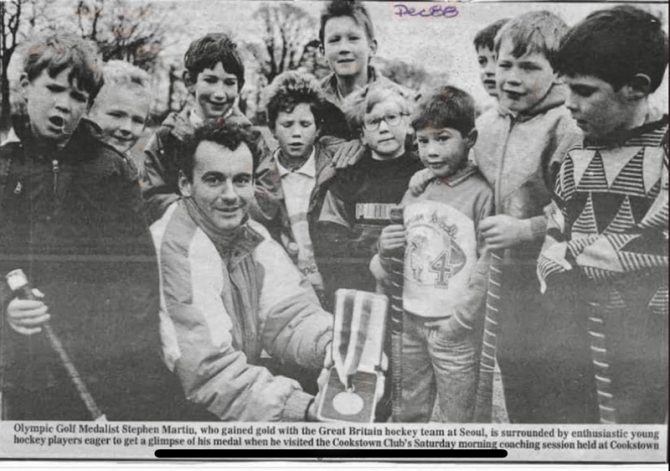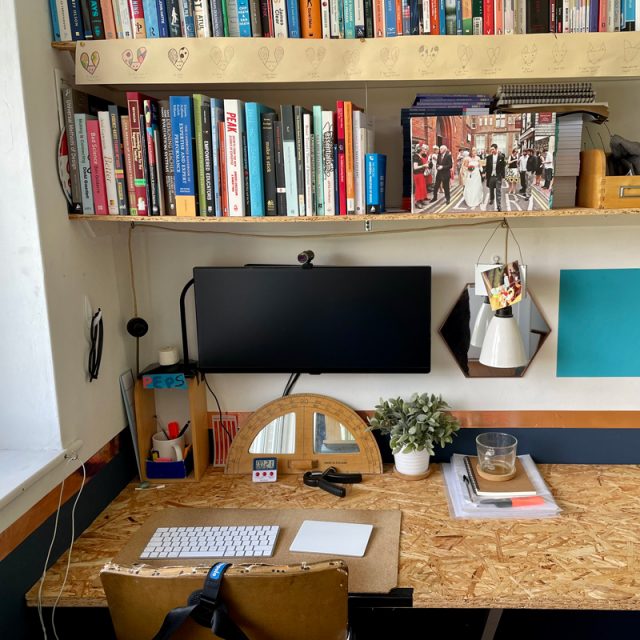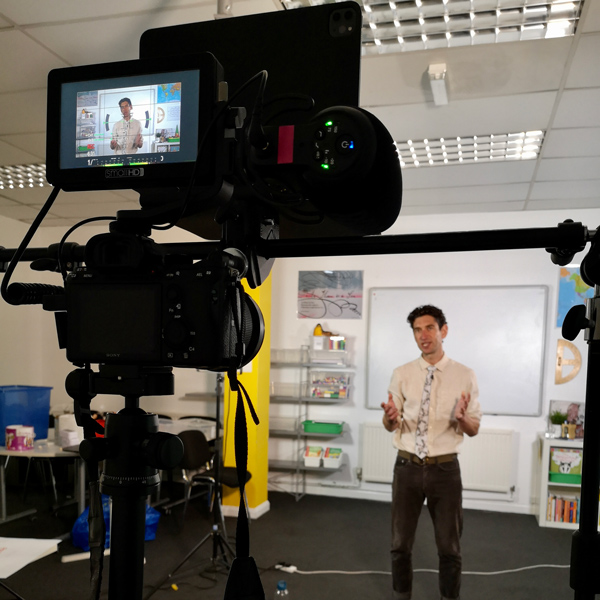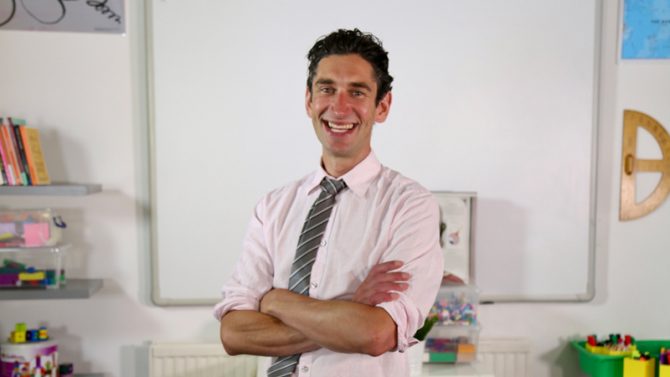Peps Mccrea is ‘obsessed with the mechanics of teaching’. Here he explains why he wants to take the mystery out of the classroom
Peps Mccrea, dean of learning design at Ambition Institute, must have one of the best names (and possibly one of the best job titles) in education. It certainly makes him a memorable social media presence, where the teacher-educator tweets research papers about how to give better lessons (he’s also an author of ultra-concise books on the subject). I can’t help myself: is Peps his real name?
“My passport name is Paul,” laughs Mccrea. “When I was in primary school, one of my teachers called all the pupils by their equivalent French first names. So, mine was Pepe or Peps, and from then on I’ve always been called that.”
It’s not the only way that school impressed itself deeply into Mccrea’s identity. Classrooms seem to be his second home. Like Mccrea, his mum was a maths teacher, and as a young child in Northern Ireland he would sit at the back of her classroom after his own school day had finished.
“I’d try and do the questions the other kids were doing. She had a lovely big blackboard, one of those roller ones you pull down. She loved teaching. I’m very proud of her – she added a lot of value to that community over a long period of time.”

Mccrea has always been surrounded by teachers: his mum’s four sisters are teachers, his sister teaches maths, and his wife is a maths lecturer. I’m just remarking on this when Mccrea jumps up and takes me eagerly downstairs (on his laptop) to the living room.
“This is our blackboard!” he grins, and there against one of the walls is a roller specimen just like his mum’s, with chalk scribblings all over it. “Look, you can see I’ve got children,” he beams, pointing to several pronouncements of ‘poo’ in wobbly handwriting. Although this blackboard is not his mum’s original, Mccrea still has her old wooden protractor, proudly displayed on his desk.
A love for his subject also appears to be inked into his very skin: he has a black circle tattooed on to one palm, and a long line inked from his hand up to his shoulder. I can’t help feeling he is himself a human blackboard. Apparently Mccrea will only reveal their full meaning over a pint, but he says as a maths teacher he particularly likes geometrical shapes.
Inspiration from the school playground also makes an appearance indoors, with an actual slide beside the stairs. “We have to get the friends’ kids to sign a waiver,” he grins. Best of all, however, is a wall beside the blackboard where pages of old maths textbooks are pasted all over like hipster wallpaper, tiny algebra equations just visible.

I ask whether this is evidence of nostalgia for a more traditional age of schooling. “No, it’s just a love of teaching. They’re artefacts from that age and history. It’s not that I think there’s a better era, actually, I think there’s potential for a lot better teaching nowadays, because we have access to much more evidence now.”
Mccrea has produced three books on teaching that have a solid fanbase in the sector. Approval from the more ‘traditionalist’ educators has led some to place Mccrea in the ‘trad’ camp, but he says he’s “agnostic” about such labels. Instead, he’s just interested in what works.
The blackboard, slides and shapes hint at the two obsessions in Mccrea’s life: teaching and design. His father was an engineer, and Mccrea was brought up on a rural farm in County Tyrone, where he says he was often building.
“There was a lot of craft and making. If you needed a new shed or a gate, you’d go and build it.” Yet while studying engineering at the University of Bath, he found he wasn’t interested in the business side.
He recalled a knack he had for explaining things to friends at schools (often leaping up to explain concepts while the teacher was out on a fag break) and so he instead started a PGCE in Brighton. It was here he began thinking hard about how lessons work.
He jumped up, ripped his book in half, swore at me, and ran out the window
Mccrea recalls “a notoriously challenging year 8 group” while on placement. “I’d got them settled and was teaching them, thinking, ‘this is amazing’.” He approached one “particularly wild” pupil and congratulated him on his graph, noting that he needed to start the x axis at 0 rather than 1.
“He jumped up, ripped his book in half, swore at me, and ran out through the window. I thought, ‘how did it go so wrong so fast?’”
After four years at another school, Mccrea returned to this same school and helped improve the maths results. Finally, after seven years at the chalkface, he was nabbed by Brighton University to teach on its PGCE course.

“The draw for me was, I loved teaching pupils, but I was even more interested in the mechanics of teaching itself. What does good teaching look like and how do you do it? It was like an obsession.”
He’s since written three books on the topic. The first, Lean Lesson Planning, was born out of a desire to help teachers establish “what you want pupils to think about at every point in the lesson. Doing that provides an explanation for why you do certain things in the lesson. Without that lens, there’s a risk you do stuff in the classroom that doesn’t form a coherent plan.” For Mccrea, better teaching is about creating a smarter design.
There’s a risk you do stuff in the classroom that doesn’t form a coherent plan
His second book, a couple of years later, was Memorable Teaching, which explained how to make best use of pupils’ working and long-term memory. “It’s pretty mainstream now, but at that stage it felt more cutting edge.”
But Mccrea decided his second book “wasn’t the full picture”. He explains that how teachers actually motivated pupils “stayed in this mysterious realm… Are you born with it? Is it charisma?”
Mccrea has a problem with the idea of an “inspirational” teacher. Evidence shows that inspiring someone doesn’t always motivate them to change their behaviour, he says. So the third book, Motivated Teaching, argues other factors have greater sway, such as “social proof”.
“Think about Facebook and Twitter,” he says. “They have hundreds of developers whose job it is to get you to do a specific thing. There’s a lot we can learn from them in terms of how to motivate people to do things.” The ‘like’ button, for instance, works as social proof, just like the star ratings for Amazon products. Teachers can use this insight in the classroom.
“The classic mistake is if I tell my class, ‘lots of you didn’t do your homework, sort it out’, then the normative message I’m sending is that most people don’t do their homework, and those who did are now feeling anxious, because they’re at risk of not being part of the group.”
Instead, teachers should congratulate the majority when they do something right – not highlight the fact the majority have not done what the teacher wants. His point is that teachers can boost pupil motivation by understanding how norms and belonging work.

Mccrea has clearly thought hard about the mechanics of teaching. Why look so closely?
“Because teaching is so hard and so complex. It deserves and needs a real level of attention. It’s too easy to treat aspects of teaching as a mystery and write them off.”
As dean of learning design at Ambition Institute (‘dean’ conjuring up a university figure, knee-deep in research), Mccrea has landed a role he could almost have written himself. “In a lot of other teacher education contexts, I had to be the designer and the deliverer, whereas here we have a dedicated design team, and a dedicated delivery team. So I can make sure my team are really expert at understanding the curriculum.”
His team have been mapping out the Early Career Framework, for which Ambition is a lead provider. Under the framework, new teachers are funded for a structured two-year package of professional development. It will be rolled out nationally from September.
“It’s about creating the points to engage with the evidence at a deeper level,” reflects Mccrea, excitedly. “It’s one step closer to teaching people more as we do in medicine.”














Your thoughts